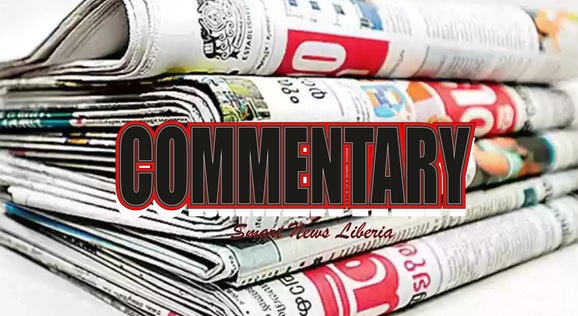MONROVIA, LIBERIA – Activist Martin K. N. Kollie on December 2, 2024, delivered a critique of Liberia’s financial mismanagement, accusing successive governments of wasting nearly US$1 billion in three critical areas. Kollie’s statement, issued from exile, challenged Liberians to reflect on the squandered opportunities that have left their nation in a state of perpetual underdevelopment. He also criticized the celebration surrounding the arrival of an Ethiopian Airlines Boeing 737, asking why Liberia, once considered the “Pride of Africa,” now revels in the achievements of other nations.
Kollie’s analysis begins with the Roberts International Airport (RIA), which he described as a symbol of waste and poor planning. According to him, Liberia borrowed US$110.1 million for a leaking terminal and a bumpy runway, a project that has failed to meet international standards. This expenditure, he pointed out, could have purchased at least one Boeing 737 for a national airline. Kollie contrasted this with Ghana’s recent construction of the Prempeh International Airport at a cost of US$83.9 million and Ethiopia’s procurement of 20 Boeing 737 Max 8 aircraft at an average price of US$105 million each.
Liberia’s failure to prioritize meaningful investments, Kollie argued, is indicative of a broader pattern of financial irresponsibility. He highlighted the mismanagement of the National Security Agency (NSA), which has consumed US$167 million over 16 years without producing any measurable outcomes. Successive administrations, he claimed, have turned the NSA into a “cash cow” to siphon public resources under the guise of national security. Despite the massive expenditures, the agency remains unaudited and unaccountable.
The Legislature, another area of significant waste, has absorbed US$713 million over the last two decades. Kollie criticized lawmakers for prioritizing their inflated salaries and benefits over the public good. He alleged that members of the Legislature routinely accept bribes to approve questionable concessions and policies that undermine Liberia’s development. This trend, he argued, exemplifies the deep-seated corruption that has plagued Liberia’s governance for decades.
Kollie lamented Liberia’s decline from a nation once celebrated as the “Pride of Africa” to one that now looks to Ethiopia for inspiration. He described Liberia’s 177 years of independence as a wasted opportunity, with leaders who act like a “7-year-old great-granddaughter” compared to Ethiopia, which gained independence in 1941 and has since become a model of progress. For Kollie, the celebration of an Ethiopian Airlines flight is a stark reminder of how far Liberia has fallen behind.
He underscored the dire consequences of Liberia’s financial mismanagement, noting that while leaders enjoy extravagant privileges, ordinary citizens remain among the poorest in the world. Kollie pointed out that Liberia has spent US$1 billion on projects and institutions that have yielded little to no benefit for the average Liberian. Despite this, the country remains dependent on foreign aid, with widespread hunger, insecurity, and poor infrastructure.
In his statement, Kollie provided a detailed breakdown of the financial waste. The US$110.1 million spent on RIA, the US$167 million allocated to the NSA, and the US$713 million consumed by the Legislature add up to nearly US$1 billion. He emphasized that this amount could have been used to transform Liberia’s infrastructure, including the reactivation of Air Liberia, which could serve as a national symbol of progress and pride.
The activist questioned why Liberia has failed to achieve such milestones despite its significant expenditures. He noted that Ethiopian Airlines currently operates 156 aircraft, with 71 more on order, while Liberia has no national airline. Kollie asked whether Liberians should accept the narrative that development takes time, especially when their leaders continue to enrich themselves at the public’s expense.
Kollie also criticized the lack of accountability in public spending, noting that there have been no audits of the NSA or the Legislature. He argued that this absence of oversight has enabled a “cabal of corrupt and self-seeking elites” to exploit the country’s resources while millions of Liberians suffer. This unchecked corruption, he said, is the root cause of Liberia’s persistent underdevelopment.
He described the celebration of Ethiopian Airlines as symptomatic of Liberia’s misplaced priorities. Instead of celebrating the achievements of others, Kollie argued, Liberians should demand better governance and a renewed focus on national development. He urged the public to hold their leaders accountable and to push for reforms that would redirect resources toward transformative projects.
In his closing remarks, Kollie outlined several recommendations for addressing Liberia’s governance challenges. These included conducting comprehensive audits of the NSA and Legislature, capping public wages at US$5,000 per month, and reinvesting savings into critical sectors like infrastructure, energy, and transportation. He also called for the digitization of public procurement processes and the strict enforcement of Liberia’s Code of Conduct law.
Kollie’s statement serves as a sobering reminder of the need for urgent reforms in Liberia. He argued that without accountability and a commitment to national development, Liberia risks remaining trapped in a cycle of poverty and corruption. He urged Liberians to demand justice and to reject the culture of complacency that has allowed their leaders to squander public resources.
The activist concluded by calling for a collective awakening among Liberians. He emphasized that the country’s future depends on its citizens’ willingness to challenge the status quo and to demand a government that prioritizes their welfare over personal gain. “This is what happens when a 177-year-old mother acts like a 7-year-old great-granddaughter,” Kollie said. “It’s time for Liberia to wake up and reclaim its place as the true Pride of Africa.”







